Submitted:
02 August 2023
Posted:
03 August 2023
You are already at the latest version
Abstract

Keywords:
1. Introduction
2. Materials and Methods
2.1. Data Collection
2.2. Data Preprocessing
2.3. Topic Modeling
2.4. Change in Topics by Period
3. Results
3.1. Topic Modeling
3.2. Trend Analysis by Topic Area
4. Discussion
5. Conclusions
Author Contributions
Funding
Institutional Review Board Statement
Informed Consent Statement
Data Availability Statement
Conflicts of Interest
References
- Abbas, K., Shenk, T.E., Poole, V.N., et al. (2015), "Effects of Repetitive Sub-Concussive Brain Injury on the Functional Connectivity of Default Mode Network in High School Football Athletes", Developmental Neuropsychology 40, 51-56. [CrossRef]
- Adams, A. (2011), ""Josh Wears Pink Cleats": Inclusive Masculinity on the Soccer Field", Journal of Homosexuality 58, 579-596. [CrossRef]
- Adams, A., Anderson, E. and McCormack, M. (2010), "Establishing and challenging masculinity: The influence of gendered discourses in organized sport", Journal of language and social psychology 29, 278-300. [CrossRef]
- Agusti, D., Ballester, R., Juan-Blay, J., et al. (2020), "The Academic Background of Youth Soccer Coaches Modulates Their Behavior During Training", Frontiers in Psychology 11. [CrossRef]
- Al Attar, W.S.A., Soomro, N., Sinclair, P.J., et al. (2018), "Implementation of an evidence-based injury prevention program in professional and semi-professional soccer", International Journal of Sports Science & Coaching 13, 113-121. [CrossRef]
- Barker, J., Jones, M. and Greenlees, I. (2010), "Assessing the Immediate and Maintained Effects of Hypnosis on Self-Efficacy and Soccer Wall-Volley Performance", Journal of Sport & Exercise Psychology 32, 243-252. [CrossRef]
- Bruner, M.W., Erickson, K., Wilson, B., et al. (2010), "An appraisal of athlete development models through citation network analysis", Psychology of Sport and Exercise 11, 133-139. [CrossRef]
- Cefis, M. (2022), "Football analytics: a bibliometric study about the last decade contributions", Electronic Journal of Applied Statistical Analysis 15, 232-248. [CrossRef]
- Cetinkalp, Z.K. and Turksoy, A. (2011), "Goal Orientation and Self-Efficacy as Predictors of Male Adolescent Soccer Players' Motivation to Participate", Social Behavior and Personality 39, 925-934. [CrossRef]
- Clemente, F.M., Couceiro, M.S., Martins, F.M.L., et al. (2013), "Measuring Tactical Behaviour Using Technological Metrics: Case Study of a Football Game", International Journal of Sports Science & Coaching 8, 723-739. [CrossRef]
- Cocking, C. and Drury, J. (2014), "Talking about Hillsborough:‘Panic’as discourse in survivors' accounts of the 1989 football stadium disaster", Journal of Community & Applied Social Psychology 24, 86-99. [CrossRef]
- Colantonio, A. (2020), "Beyond Football: Intimate Partner Violence and Concussion/Brain Injury", Canadian Psychology-Psychologie Canadienne 61, 163-166. [CrossRef]
- Comas, G.N., Bardavio, J.S., Nuviala, R., et al. (2018), "Design of an observational instrument for the assessment of the penalty kicks in football and analysis of the obtained results", Revista De Psicologia Del Deporte 27, 189-199.
- Corcoran, C.M., Mittal, V.A., Bearden, C.E., et al. (2020), "Language as a biomarker for psychosis: A natural language processing approach", Schizophrenia Research 226, pp.158-166. [CrossRef]
- Coutinho, D., Goncalves, B., Wong, D.P., et al. (2018), "Exploring the effects of mental and muscular fatigue in soccer players' performance", Hum Mov Sci 58, pp. 287-296. [CrossRef]
- Dean, F., Kavanagh, E., Wilding, A., et al. (2022), "An Examination of the Experiences of Practitioners Delivering Sport Psychology Services within English Premier League Soccer Academies", Sports 10 No. 4, 60. [CrossRef]
- Donachie, T.C. and Hill, A.P. (2022), "Helping soccer players help themselves: Effectiveness of a psychoeducational book in reducing perfectionism", Journal of Applied Sport Psychology 34, 564-584. [CrossRef]
- Duncan, M.J., Weldon, A., Barnett, L.M., et al. (2022), "Perceptions and practices of fundamental movement skills in grassroots soccer coaches", International Journal of Sports Science & Coaching 17, 761-771. [CrossRef]
- Durbin, J. and Watson, G.S. (1971), "Testing for Serial Correlation in Least Squares Regression .3.", Biometrika 58, 1-19. [CrossRef]
- Egan, C.D., Verheul, M.H. and Savelsbergh, G.J. (2007), "Effects of experience on the coordination of internally and externally timed soccer kicks", Journal of Motor Behavior 39, 423-432. [CrossRef]
- Fernandes, T., Camerino, O. and Castaner, M. (2021), "T-Pattern Detection and Analysis of Football Players' Tactical and Technical Defensive Behaviour Interactions: Insights for Training and Coaching Team Coordination", Frontiers in Psychology 12. [CrossRef]
- Fessi, M.S., Nouira, S., Dellal, A., et al. (2016), "Changes of the psychophysical state and feeling of wellness of professional soccer players during pre-season and in-season periods", Research in Sports Medicine 24, 375-386. [CrossRef]
- Fielding-Lloyd, B. and Meân, L.J. (2008), "Standards and separatism: The discursive construction of gender in English soccer coach education", Sex roles 58, pp.24-39. [CrossRef]
- Fontana, F.E., Mazzardo, O., Mokgothu, C., et al. (2009), "Influence of Exercise Intensity on the Decision-Making Performance of Experienced and Inexperienced Soccer Players", Journal of Sport & Exercise Psychology 31, 135-151. [CrossRef]
- Ford, P., Hodges, N.J. and Williams, A.M. (2007), "Examining action effects in the execution of a skilled soccer kick by using erroneous feedback", Journal of Motor Behavior 39, 481-490. [CrossRef]
- Foroughi, B., Gholipour, H.F., McDonald, H., et al. (2018), "Does national culture influence the turnover frequency of national football coaches? A macro-level analysis", International Journal of Sports Science & Coaching 13, 902-911. [CrossRef]
- Gilson, T.A. (2015), "Psychology of Training Football Players: Improved Performance and Success", Strength and Conditioning Journal 37, 102-108. [CrossRef]
- Gomez, M.A., Lago-Penas, C., Gomez, M.T., et al. (2021), "Impact of elite soccer coaching change on team performance according to coach- and club-related variables", Biology of Sport 38, 603-608. [CrossRef]
- Haddad, M., Chaouachi, A., Wong del, P., et al. (2013), "Influence of fatigue, stress, muscle soreness and sleep on perceived exertion during submaximal effort", Physiology & Behavior 119, pp. 185-189. [CrossRef]
- Hammami, M., Negra, Y., Billaut, F., et al. (2018), "Effects of Lower-Limb Strength Training on Agility, Repeated Sprinting with Changes of Direction, Leg Peak Power, and Neuromuscular Adaptations of Soccer Players", Journal of Strength and Conditioning Research 32, 37-47. [CrossRef]
- Hendry, D.T., Williams, A.M. and Hodges, N.J. (2018), "Coach ratings of skills and their relations to practice, play and successful transitions from youth-elite to adult-professional status in soccer", Journal of Sports Sciences 36 No. 17, pp.2009-2017. [CrossRef]
- Hertting, K., Grahn, K. and Wagnsson, S. (2022), "Supportive Communities: Conceptualizing Supportive Structures for Coaches' Learning and Well-Being in Community Youth Soccer", International Journal of Environmental Research and Public Health 19 No. 14. [CrossRef]
- Hill, A.P., Mallinson-Howard, S.H. and Jowett, G.E. (2018), "Multidimensional Perfectionism in Sport: A Meta-Analytical Review", Sport Exercise and Performance Psychology 7, 235-270. [CrossRef]
- Hirose, K. and Meijen, C. (2022), "An exploration of elite Japanese female footballers' acute cultural transition experiences in Europe", Science and Medicine in Football 6, 660-667. [CrossRef]
- Hirschberg, J. and Manning, C.D. (2015), "Advances in natural language processing", Science 349 No. 6245, pp. 261-266. [CrossRef]
- Hoigaard, R., Haugen, T., Johansen, B.T., et al. (2017), "Team identity in youth soccer: The role of coaches' feedback patterns and use of humour", International Journal of Sports Science & Coaching 12, 697-707. [CrossRef]
- Holt, J.E., Kinchin, G. and Clarke, G. (2012), "Effects of peer-assessed feedback, goal setting and a group contingency on performance and learning by 10-12-year-old academy soccer players", Physical Education and Sport Pedagogy 17, 231-250. [CrossRef]
- Horrocks, D.E., McKenna, J., Whitehead, A.E., et al. (2016), "Preparation, structured deliberate practice and decision making in elite level football: The case study of Gary Neville (Manchester United FC and England)", International Journal of Sports Science & Coaching 11, 673-682. [CrossRef]
- Høigaard, R., Jones, G.W. and Peters, D.M. (2008), "Preferred coach leadership behaviour in elite soccer in relation to success and failure", International Journal of Sports Science & Coaching 3, 241-250. [CrossRef]
- Jelodar, H., Wang, Y.L., Yuan, C., et al. (2019), "Latent Dirichlet allocation (LDA) and topic modeling: models, applications, a survey", Multimedia Tools and Applications 78 No. 11, pp.15169-15211. [CrossRef]
- Jin, G. (2022), "The Influence of Football Exercise on the Rehabilitation of Chinese College Students with Mental Illness", Psychiatria Danubina 34, pp. S939-S943.
- Jones, B., Eather, N., Miller, A., et al. (2023), "Evaluating the impact of a coach development intervention for improving coaching practices and player outcomes in football: the MASTER Coaching randomised control trial", Physical Education and Sport Pedagogy. [CrossRef]
- pp.450-457. [CrossRef]
- Kamyab, M., Liu, G.H. and Adjeisah, M. (2021), "Attention-Based CNN and Bi-LSTM Model Based on TF-IDF and GloVe Word Embedding for Sentiment Analysis", Applied Sciences-Basel 11 No. 23. [CrossRef]
- Keatlholetswe, L. and Malete, L. (2019), "Coaching Efficacy, Player Perceptions of Coaches' Leadership Styles, and Team Performance in Premier League Soccer", Research Quartelyfor Exercise and Sport 90, 71-79. [CrossRef]
- Kennedy, K.W., Steinfeldt, J.A., Eppich, A., et al. (2021), "Football Players' Beliefs About Masculinity, Affection Between Men, and Gay Teammates", Psychology of Men & Masculinities 22, 16-25. [CrossRef]
- Kim, S. and Connaughton, D.P. (2021), "Soccer, concussions, and safety: Perceptions of parents of youth soccer participants", Journal of Safety Research 77, pp. 255-262. [CrossRef]
- Kirkendall, D.T. and Krustrup, P. (2022), "Studying professional and recreational female footballers: A bibliometric exercise", Scandinavian Journal of Medicine & Science in Sports 32, pp.12-26. [CrossRef]
- Klarin, A. (2019), "Mapping product and service innovation: A bibliometric analysis and a typology", Technological Forecasting and Social Change 149, 119776. [CrossRef]
- Kotrba, V. (2019), "Direct preferences of sports fans: Is there a superstar effect in the fantasy league?", Journal of Behavioral and Experimental Economics 78, pp. 89-97. [CrossRef]
- Kroshus, E. and DeFreese, J.D. (2017), "Athlete Burnout Prevention Strategies Used by US Collegiate Soccer Coaches", Sport Psychologist 31, 332-343. [CrossRef]
- Krupitzer, C., Naber, J., Stauffert, J.P., et al. (2022), "CortexVR: Immersive analysis and training of cognitive executive functions of soccer players using virtual reality and machine learning", Frontiers in Psychology 13. [CrossRef]
- Kwon, J., Elliott, S. and Velardo, S. (2020), "Exploring perceptions about the feasibility of educational video resources as a strategy to support parental involvement in youth soccer", Psychology of Sport and Exercise 50. [CrossRef]
- Lavallee, D. (2005), "The effect of a life development intervention on sports career transition adjustment", Sport Psychologist 19, 193-202. [CrossRef]
- Li, J., Gao, H., Liu, P., et al. (2020), "Does Distance Produce Beauty? The Influence of COVID-19 Lockdown on the Coach-Athlete Relationship in a Chinese Football School", Frontiers in Psychology 11, pp. 560638. [CrossRef]
- Lopes, J.E., Jacobs, D.M., Travieso, D., et al. (2014), "Predicting the lateral direction of deceptive and non-deceptive penalty kicks in football from the kinematics of the kicker", Human Movement Science 36, pp.199-216. [CrossRef]
- Ma, T.H., Pan, Q., Rong, H., et al. (2022), "T-BERTSum: Topic-Aware Text Summarization Based on BERT", Ieee Transactions on Computational Social Systems 9, 879-890. [CrossRef]
- Marholz, P.F.O., Chirosa, L.J., Tamayo, I.M., et al. (2016), "Sport commitment via the motivational climate created by mother, father and coach in young football players", Revista De Psicologia Del Deporte 25, 245-252.
- McMorris, T. and Colenso, S. (1996), "Anticipation of professional soccer goalkeepers when facing right- and left-footed penalty kicks", Perceptual and Motor Skills 82, 931-934. [CrossRef]
- Mehrsafar, A.H., Zadeh, A.M., Sanchez, J.C.J., et al. (2021), "Competitive anxiety or Coronavirus anxiety? The psychophysiological responses of professional football players after returning to competition during the COVID-19 pandemic", Psychoneuroendocrinology 129. [CrossRef]
- Moll, T. and Davies, G.L. (2021), "The effects of coaches' emotional expressions on players' performance: Experimental evidence in a football context", Psychology of Sport and Exercise 54. [CrossRef]
- Morgan, E.A., Johnson, S.T., Bovbjerg, V.E., et al. (2018), "Associations between player age and club soccer coaches' perceptions of injury risk and lower extremity injury prevention program use", International Journal of Sports Science & Coaching 13, 122-128. [CrossRef]
- Murr, D., Raabe, J. and Honer, O. (2018), "The prognostic value of physiological and physical characteristics in youth soccer: A systematic review", European Journal of Sport Science 18, 62-74. [CrossRef]
- Musculus, L., Bader, J., Sander, L., et al. (2021), "The Influence of Environmental Constraints in 360 degrees Videos on Decision Making in Soccer", Journal of Sport & Exercise Psychology 43, 365-374. [CrossRef]
- Myers, N.D., Feltz, D.L., Maier, K.S., et al. (2006), "Athletes' evaluations of their head coach's coaching competency", Research quarterly for exercise and sport 77, 111-121. [CrossRef]
- Navia, J.A., van der Kamp, J., Aviles, C., et al. (2019), "Self-Control in Aiming Supports Coping With Psychological Pressure in Soccer Penalty Kicks", Frontiers in Psychology 10, 1438. [CrossRef]
- Negra, Y., Sammoud, S., Uthoff, A., et al. (2022), "The effects of repeated backward running training on measures of physical fitness in youth male soccer players", Journal of Sports Sciences 40 No. 24, pp.2688-2696. [CrossRef]
- Nunes, N.A., Goncalves, B., Coutinho, D., et al. (2021), "How playing area dimension and number of players constrain football performance during unbalanced ball possession games", International Journal of Sports Science & Coaching 16, 334-343. 1747954120966416. [CrossRef]
- O'Callaghan, D., Greene, D., Carthy, J., et al. (2015), "An analysis of the coherence of descriptors in topic modeling", Expert Systems with Applications 42 No. 13, pp.5645-5657. [CrossRef]
- Partington, M. and Cushion, C. (2013), "An investigation of the practice activities and coaching behaviors of professional top-level youth soccer coaches", Scandinavian Journal of Medicine & Science in Sports 23, 374-382. [CrossRef]
- Pereira, M.R. and Patching, G.R. (2021), "Goal Side Selection of Penalty Shots in Soccer: A Laboratory Study and Analyses of Men's World Cup Shoot-Outs", Perceptual and Motor Skills 128, 2279-2303. 00315125211025412. [CrossRef]
- Pulido, J.J., Sánchez-Oliva, D., Sánchez-Miguel, P.A., et al. (2018), "Sport commitment in young soccer players: A self-determination perspective", International Journal of Sports Science & Coaching 13, 243-252. [CrossRef]
- Redkva, P.E., Gregorio da Silva, S., Paes, M.R., et al. (2017), "The relationship between coach and player training load perceptions in professional soccer", Perceptual and Motor Skills 124, 264-276. [CrossRef]
- Redkva, P.E., Gregorio da Silva, S., Paes, M.R., et al. (2017), "The relationship between coach and player training load perceptions in professional soccer", Perceptual and Motor Skills 124, 264-276. [CrossRef]
- Ren, Y., Wang, C. and Lu, A. (2022), "Effects of perceptual-cognitive tasks on inter-joint coordination of soccer players and ordinary college students", Frontiers in Psychology 13, pp.892118. [CrossRef]
- Robaldo, L., Villata, S., Wyner, A., et al. (2019), "Introduction for artificial intelligence and law: special issue "natural language processing for legal texts"", Artificial Intelligence and Law 27, 113-115. [CrossRef]
- Ren, Y., Wang, C. and Lu, A. (2022), "Effects of perceptual-cognitive tasks on inter-joint coordination of soccer players and ordinary college students", Frontiers in Psychology 13, pp.892118. [CrossRef]
- Robaldo, L., Villata, S., Wyner, A., et al. (2019), "Introduction for artificial intelligence and law: special issue "natural language processing for legal texts"", Artificial Intelligence and Law 27, 113-115. [CrossRef]
- Scaccia, J.P. (2021), "Examining the concept of equity in community psychology with natural language processing", Journal of Community Psychology 49, 1718-1731. [CrossRef]
- Seo, Y., Kim, K. and Kim, J.S. (2021), "Trends of Nursing Research on Accidental Falls: A Topic Modeling Analysis", International Journal of Environmental Research and Public Health 18 No. 8. [CrossRef]
- Shafizadeh, M., Lago-Penas, C., Gridley, A., et al. (2014), "Temporal Analysis of Losing Possession of the Ball Leading to Conceding a Goal: A Study of the Incidence of Perturbation in Soccer", International Journal of Sports Science & Coaching 9, 627-636. [CrossRef]
- Swallow, W.E., Skidmore, N., Page, R.M., et al. (2021), "An examination of in-season external training load in semi-professional soccer players: considerations of one and two match weekly microcycles", International Journal of Sports Science & Coaching 16, 192-199. [CrossRef]
- Terry, D.P., Mewborn, C.M. and Miller, L.S. (2019), "Repeated Sport-Related Concussion Shows Only Minimal White Matter Differences Many Years After Playing High School Football", Journal of the International Neuropsychological Society 25, 950-960. [CrossRef]
- Terryshort, L.A., Owens, R.G., Slade, P.D., et al. (1995), "Positive and Negative Perfectionism", Personality and Individual Differences 18, 663-668. [CrossRef]
- Tian, C., Zhang, J.Y., Liu, D.Y., et al. (2022), "Technological topic analysis of standard-essential patents based on the improved Latent Dirichlet Allocation (LDA) model", Technology Analysis & Strategic Management. [CrossRef]
- Tighe, P.J., Sannapaneni, B., Fillingim, R.B., et al. (2020), "Forty-two Million Ways to Describe Pain: Topic Modeling of 200,000 PubMed Pain-Related Abstracts Using Natural Language Processing and Deep Learning-Based Text Generation", Pain Medicine 21 No. 11, pp.3133-3160. [CrossRef]
- Traclet, A., Rascle, O., Souchon, N., et al. (2008), "Aggressor and victim perspective-related differences in perceived legitimacy of aggression in soccer", Perceptual and Motor Skills 106, 234-240. [CrossRef]
- Vaeyens, R., Lenoir, M., Williams, A.M., et al. (2008), "Talent identification and development programmes in sport - Current models and future directions", Sports Medicine 38, 703-714. [CrossRef]
- Vanraalte, J.L., Brewer, D.D. and Linder, D.E. (1992), "Ncaa Division-Ii College Football Players Perceptions of an Athlete Who Consults a Sport Psychologist", Journal of Sport & Exercise Psychology 14, 273-282. [CrossRef]
- Vanyperen, N.W. (1995), "Interpersonal Stress, Performance-Level, and Parental Support - a Longitudinal-Study among Highly Skilled Young Soccer Players", Sport Psychologist 9, 225-241. [CrossRef]
- Varela-Quintana, C., Cuervo, J.D. and Prieto-Rodriguez, J. (2016), "The effect of an additional substitution in association football. Evidence from the Italian Serie A", Revista De Psicologia Del Deporte 25, pp.101-105.
- Vayansky, I. and Kumar, S.A.P. (2020), "A review of topic modeling methods", Information Systems 94. [CrossRef]
- Vieira, L.F., do Nascimento, J.R.A. and Vieira, J.L.L. (2013), "Perfectionism and Group Cohesion among Adult Indoor Soccer Players", Revista De Psicologia Del Deporte 22, 331-336.
- Villalonga, T., Garcia-Mas, A., de las Heras, R., et al. (2015), "Creation and Tasks of a Sport Psychology Department in a Professional Soccer Club", Revista De Psicologia Del Deporte 24, 319-326.
- Vorontsov, K., Potapenko, A. and Plavin, A. (2015), "Additive Regularization of Topic Models for Topic Selection and Sparse Factorization", Statistical Learning and Data Sciences 9047, pp.193-202. [CrossRef]
- Vu, A., Sorel, A., Limballe, A., et al. (2022), "Multiple Players Tracking in Virtual Reality: Influence of Soccer Specific Trajectories and Relationship With Gaze Activity", Frontiers in Psychology 13. [CrossRef]
- Yao, Z.F., Sligte, I.G., Moreau, D., et al. (2020), "The brains of elite soccer players are subject to experience-dependent alterations in white matter connectivity", Cortex 132, pp.79-91. [CrossRef]
- Yiannaki, C., Carling, C. and Collins, D. (2018), "Futsal as a potential talent development modality for soccer - a quantitative assessment of high-level soccer coach and player perceptions", Science and Medicine in Football 2, 299-308. [CrossRef]
- Zhao, Y.F., Fu, Z.G. and Chen, F. (2016), "Research on Big data Preprocessing Technology of Thermal System", 2nd Annual International Conference on Energy, Environmental & Sustainable Ecosystem Development (Eesed 2016) 115, pp.303-311.
- Zhongfan, L., Inomata, K. and Takeda, T. (2002), "Soccer player's and closed-skill athletes' execution of a complex motor skill", Percept Mot Skills 95, 213-218. [CrossRef]
- Zoudji, B. and Thon, B. (2003), "Expertise and implicit memory: Differential repetition priming effects on decision making in experienced and inexperienced soccer players.", International Journal of Sport Psychology 34, 189-207.
- Zourbanos, N., Haznadar, A., Papaioannou, A., et al. (2016), "The Relationships Between Athletes' Perceptions of Coach-Created Motivational Climate, Self-Talk, and Self-Efficacy in Youth Soccer", Journal of Applied Sport Psychology 28, 97-112. [CrossRef]
- Zucchermaglio, C. (2005), "Who wins and who loses: The rhetorical manipulation of social identities in a soccer team", Group Dynamics: Theory, Research, and Practice 9, 219. [CrossRef]
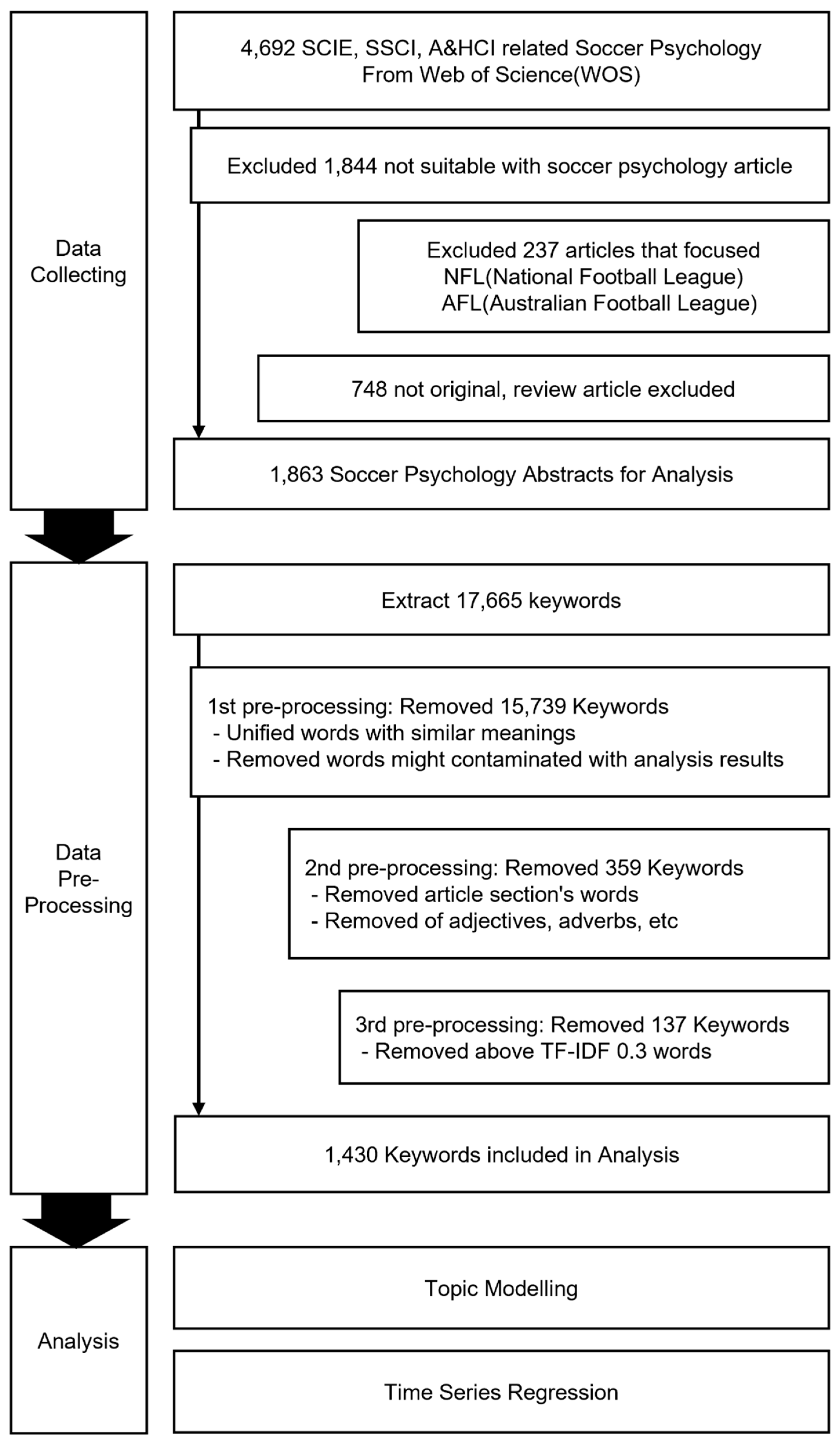
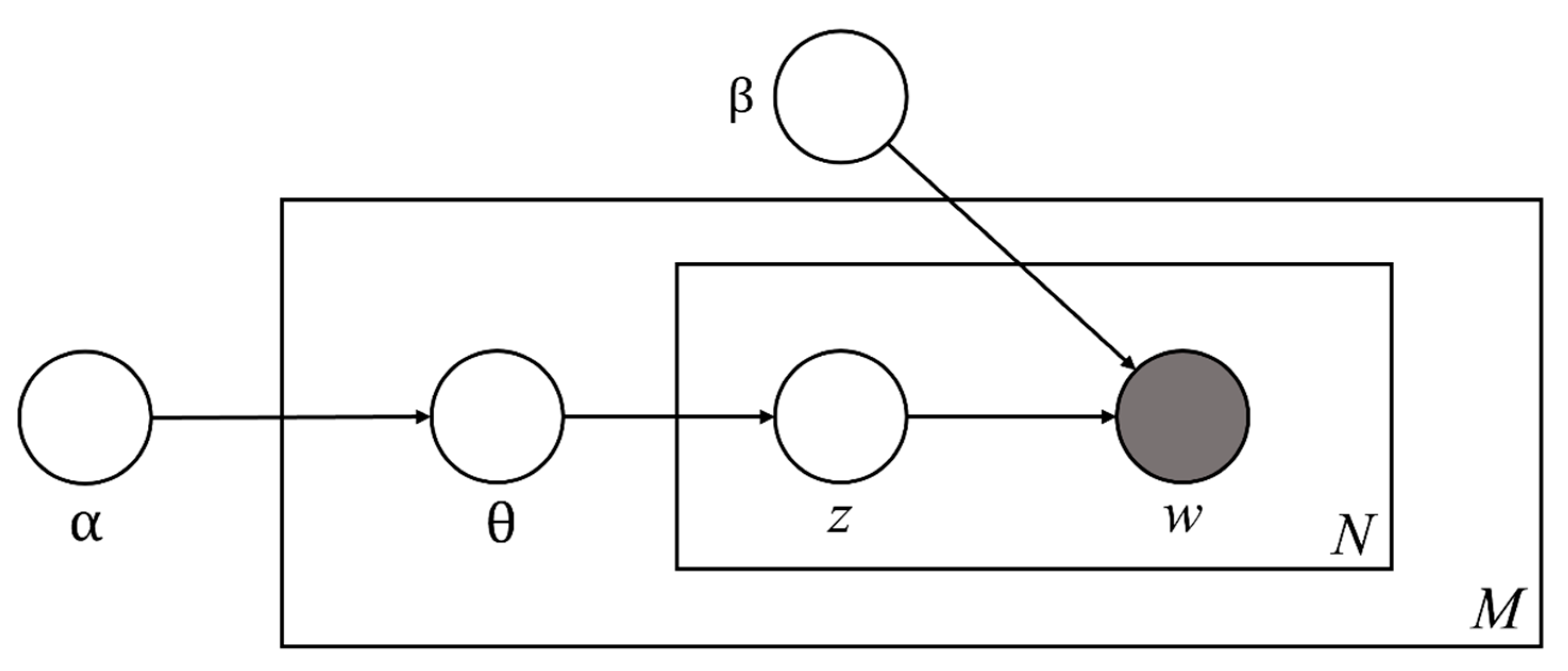
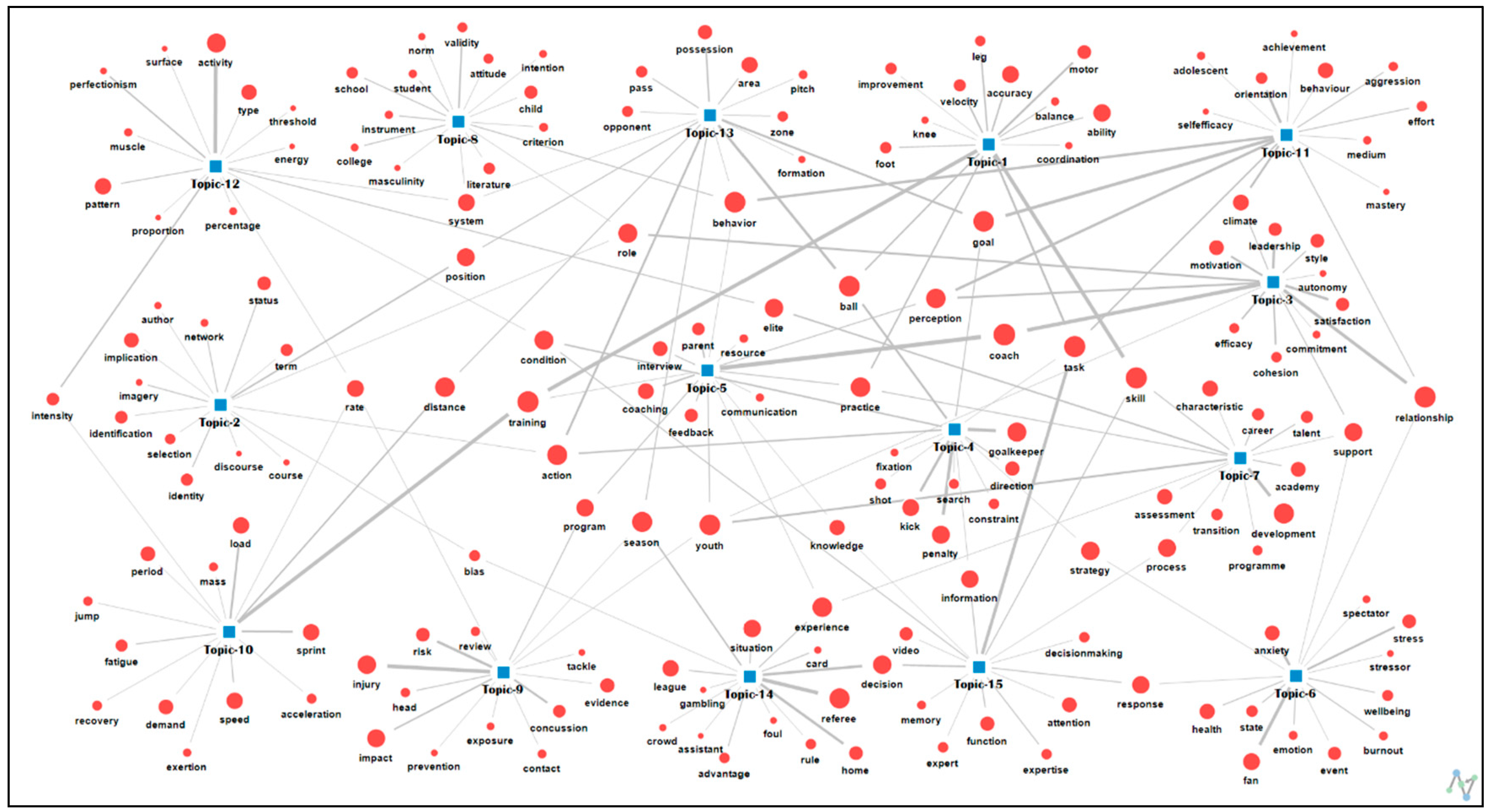
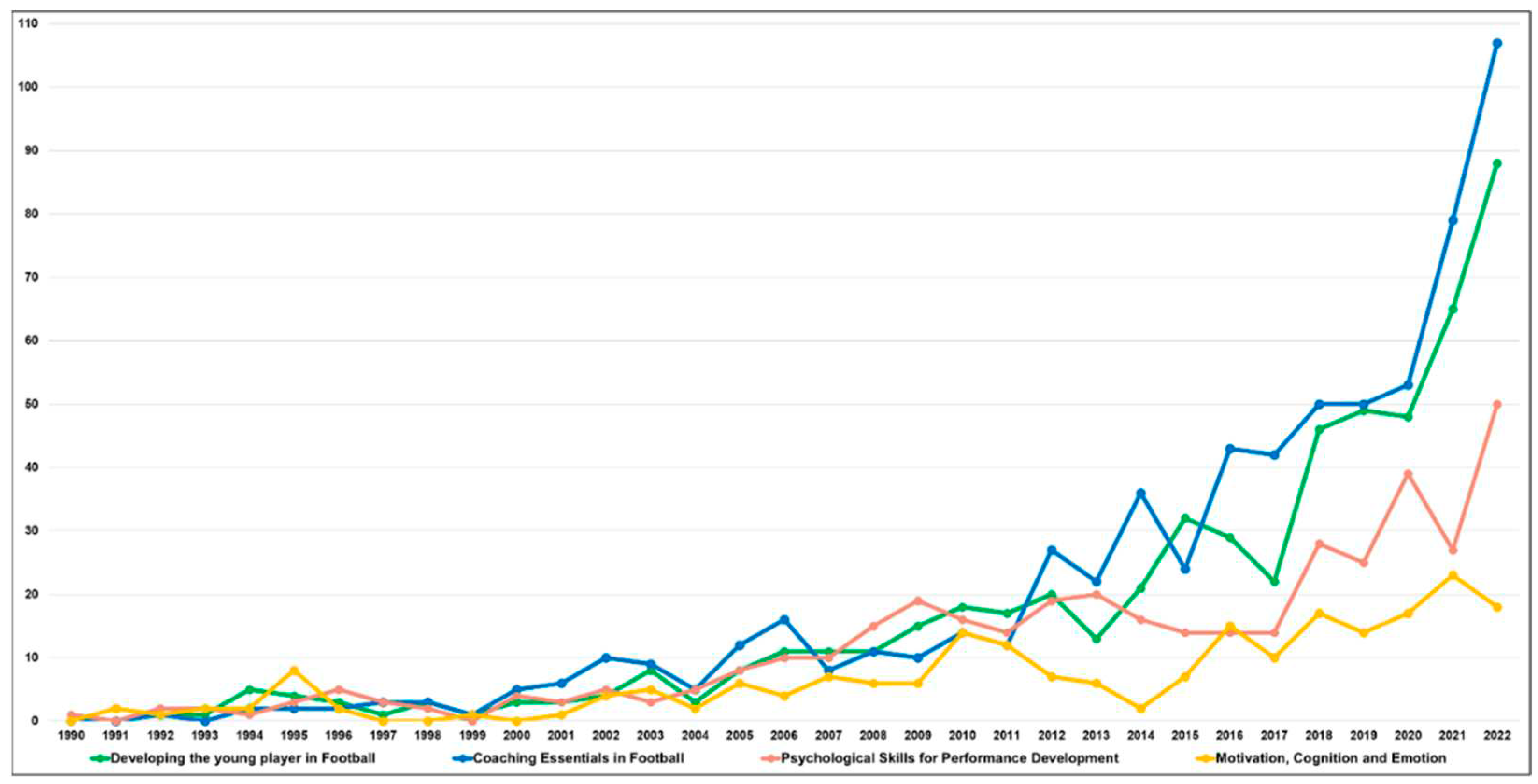
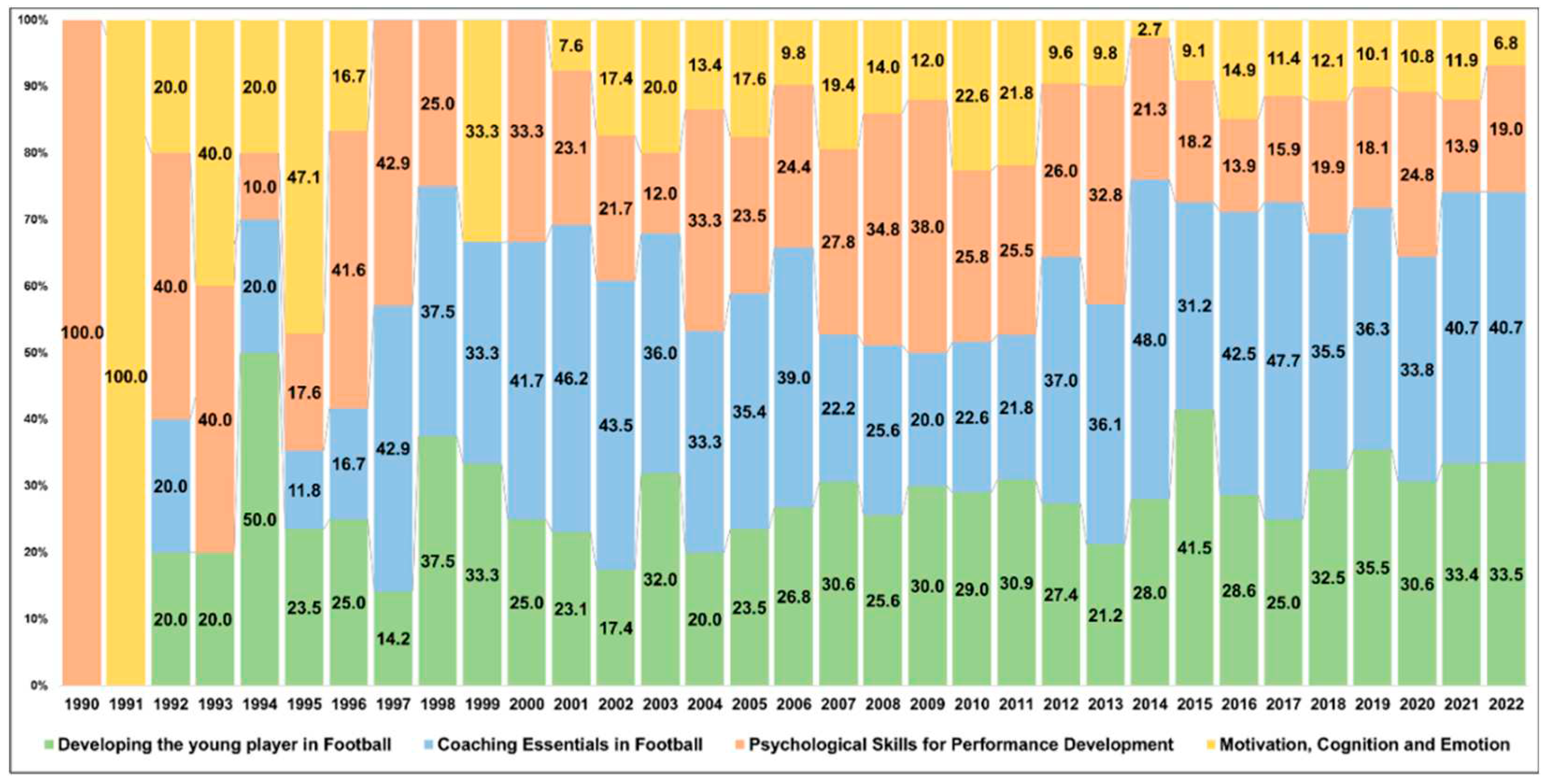
| Topic 1 | Topic-2 | Topic 3 | Topic 4 | Topic 5 | Topic 6 | Topic 7 |
| skill | position | coach | goalkeeper | coach | anxiety | development |
| training | identity | relationship | penalty | coaching | stress | youth |
| motor | status | leadership | kick | parent | health | elite |
| task | network | satisfaction | ball | feedback | state | skill |
| leg | imagery | motivation | condition | perception | burnout | academy |
| practice | term | perception | action | practice | wellbeing | talent |
| ball | selection | role | goal | youth | emotion | career |
| accuracy | identification | efficacy | direction | program | support | practice |
| velocity | role | cohesion | shot | interview | response | transition |
| foot | bias | support | task | training | relationship | assessment |
| ability | action | style | search | experience | stressor | process |
| balance | author | relation | information | behavior | mood | program |
| knee | course | commitment | strategy | communication | strategy | experience |
| improvement | implication | coaching | constraint | knowledge | depression | support |
| coordination | discourse | autonomy | fixation | resource | behavior | characteristic |
| Topic 8 | Topic 9 | Topic 10 | Topic 11 | Topic 12 | Topic 13 | Topic 14 |
| validity | injury | training | goal | activity | ball | task |
| student | risk | load | behavior | intensity | goal | decision |
| behavior | concussion | sprint | orientation | perfectionism | action | expertise |
| instrument | impact | distance | perception | elite | possession | information |
| college | head | fatigue | climate | pattern | season | skill |
| school | program | speed | task | surface | position | function |
| child | youth | rate | relationship | type | distance | condition |
| criterion | prevention | acceleration | aggression | energy | pass | response |
| role | exposure | jump | effort | muscle | area | process |
| norm | review | period | mastery | percentage | zone | Decision making |
| masculinity | season | mass | Self-efficacy | threshold | pitch | expert |
| attitude | tackle | demand | behavior | condition | behavior | memory |
| intention | rate | exertion | medium | proportion | system | attention |
| system | evidence | intensity | adolescent | rate | opponent | video |
| literature | contact | recovery | achievement | system | formation | knowledge |
| Topic Area | Topic No. | Durbin-Watson | Coefficient | t-Value | p-Value | Hot/Cold |
|---|---|---|---|---|---|---|
| Developing the young player in Football | Topic 5 | 0.263 | 0.834 | 8.431 | 0.001 | - |
| Topic 7 | ||||||
| Topic 8 | ||||||
| Topic 9 | ||||||
| Coaching Essentials in Football | Topic 1 | 0.272 | 0.836 | 8.498 | 0.001 | - |
| Topic 2 | ||||||
| Topic 3 | ||||||
| Topic 10 | ||||||
| Topic 13 | ||||||
| Psychological Skills for Performance Development | Topic 4 | 0.784 | 0.865 | 9.616 | 0.001 | - |
| Topic 12 | ||||||
| Topic 14 | ||||||
| Motivation, Cognition, and Emotion | Topic 6 | 0.759 | 0.816 | 7.850 | 0.001 | - |
| Topic 11 |
| Topic Area | Topic No. | Durbin-Watson | Coefficient | t-Value | p-Value | Hot/Cold |
|---|---|---|---|---|---|---|
| Developing the young player in Football | Topic 5 | 1.554 | 0.470 | 2.961 | 0.006 | Hot |
| Topic 7 | ||||||
| Topic 8 | ||||||
| Topic 9 | ||||||
| Coaching Essentials in Football | Topic 1 | 0.908 | 0.585 | 4.019 | 0.001 | |
| Topic 2 | ||||||
| Topic 3 | ||||||
| Topic 10 | ||||||
| Topic 13 | ||||||
| Psychological Skills for Performance Development | Topic 4 | 1.981 | -0.325 | -1.912 | 0.065 | Cool |
| Topic 12 | ||||||
| Topic 14 | ||||||
| Motivation, Cognition, and Emotion | Topic 6 | 2.443 | -0.384 | -2.31 | 0.027 | Cold |
| Topic 11 |
Disclaimer/Publisher’s Note: The statements, opinions and data contained in all publications are solely those of the individual author(s) and contributor(s) and not of MDPI and/or the editor(s). MDPI and/or the editor(s) disclaim responsibility for any injury to people or property resulting from any ideas, methods, instructions or products referred to in the content. |
© 2023 by the authors. Licensee MDPI, Basel, Switzerland. This article is an open access article distributed under the terms and conditions of the Creative Commons Attribution (CC BY) license (http://creativecommons.org/licenses/by/4.0/).





